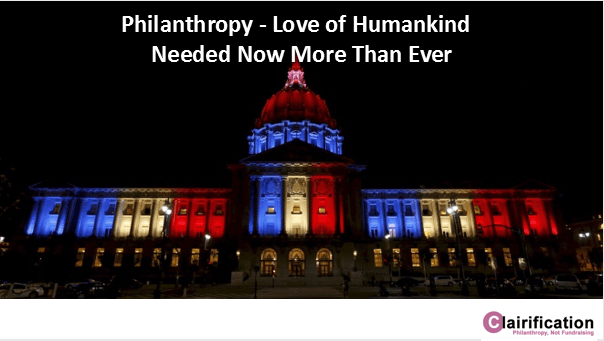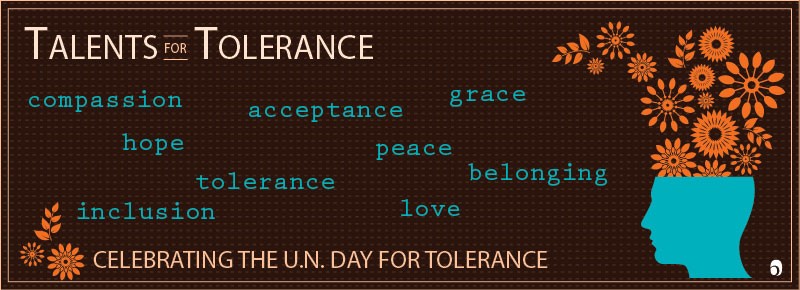The world can seem a cruel place. Never more so than when horrific, senseless events unfold and innocent people are killed, maimed and scarred. Philanthropy, love and compassion can seem elusive.
Yet it’s right here. In each of us. To choose, or to not choose. To pay attention to, or to ignore.
Today, and all this week, we celebrate the United Nation’s International Day for Tolerance. While it may seem we haven’t much to celebrate right now, the reverse is true.
Because for every suicidal terrorist who rises up, 100 more will rise up against them. And soon it will be 1,000 more. Then 10,000 more. Humanity has the will to survive — through caring.
Not just the will to survive but, in fact, the need. For throughout history the civilizations that have survived have been those which banded together to care for their brethren.
Sure, we’ve all heard about “survival of the fittest.” But did you know that was not Darwin’s idea? He never meant to imply that civilization would survive by the strongest killing off the weakest. Though the concept is attributed to him, it really comes from the philosopher Herbert Spencer. And it is widely misunderstood.
In one-to-one battles the fittest may survive. But in the end, it’s not about individuals. It’s about groups. Tribes. Communities. And those that survive are the most compassionate.
Even in the wild it’s not every animal for itself. Cooperation turns out to be the most successful survival strategy. Complex cells evolved from cooperating simple cells. Multicellular organisms are made up of cooperating complex cells. Superorganisms such as bee or ant colonies consist of cooperating individuals, in a condition bioligists call eusociality.
Individual selection tends to favor selfish behavior. In the eusocial group however, members perform altruistic acts, sometimes against their own personal interests, to benefit their group.
When cooperation breaks down, the results can be disastrous.
For example, when cells in our bodies turn rogue the result is cancer. A single cell can break free from the pack and create something monstrous. When isolated individuals — terrorists — turn rogue the result is similarly evil and chaotic. Pandemonium. Bedlam.
In my teen-age daughter’s lingo, it makes the world totally cray-cray.
This is what makes the civil sector so important.
As staff, volunteers and patrons we choose to act altruistically. To stand united against cruelty, intolerance and injustice.
As individuals, families and communities we choose to act with compassion and honor. To stand up to horror, hatred and craziness.
We commit to stand together until senseless carnage is obliterated from the face of the earth.
Today just happens to be the day scheduled, in advance, to shine a world-wide light on tolerance. All week there will be events all over the world dedicated to strengthening tolerance. In light of recent events in Paris, Beirut, Baghdad, Syria and around the globe, there can be no time like the present to begin to say “No More.”
What can you do to celebrate the International Day for Tolerance?
- If you work in the social benefit sector, you can keep doing what you do.
- If you are a philanthropist ( a donor or volunteer), you can keep doing what you do.
- Either way, you can dedicate yourself to doing more, with greater passion, deeper commitment and renewed zeal. Do it with the understanding that compassion makes a difference. Tolerance is powerful.
- You can also participate in free Talent for Tolerance online webinars.
- If you do nothing else, you can get your Brain Talent Profile for free, November 14 – 20, and discover your unique strengths. Then you can use these talents to make our world more empathic, inclusive and positive.
- Then, go to the action plan put together by the folks at Six Seconds (experts on developing emotional intelligence to create positive change).
- Together, talk about how you can add peace to your own community.
To Take the Assessment: Just click one of these links to take the assessment.
Adult version – click here for English. Or click for: Italian. Chinese. Portuguese. Arabic.
Youth version (ages 7-18): click here for English. Or click for: Italian. Arabic. Note: For youth 7 – 12 please ask a parent or adult to help you – where it asks for email, please put your adult’s email address, and they will receive the report and share it with you.
The assessment takes about 10 minutes. Then you’ll get your Profile by email. Ask your friends and family and colleagues to take the test too. Next,
Reflect. Discuss. Reflect some more.
It’s a good place to start.
Please share your thoughts and reflections in the comments below. May peace and strength be with you, and with us all.








Brilliant Claire. So true, and so important to state, right now. Thank you!
Thank you Linda. I’m so glad you agree. Are you familiar with the Talmudic saying “Whoever saves a single life, it is considered as if he save the entire world?” It is incumbent on each of us to do what we can, especially when problems seem huge and insurmountable. If everyone saved a life, then the entire world truly would be saved.